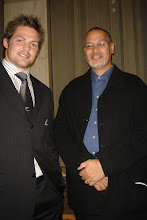There is a wonderful term for people who pass through a place as a temporary resident. It is Sojourner. I wish I'd known this when I lived in London, it sounds so much better than...actually I don't know what we called ourselves, we were just Kiwis on our OE. Sojourner sounds so much cooler.
This is an interesting group mainly because so little evidence was left behind by them. Known as Pakeha-Maori or Intermediaries or Go-Betweens or the Third New Zealander. they bridged the gap between Maori and visiting Europeans. Few were literate and so most of the records about them are written by others. Most of these records are written by Missionaries and often reflect the bias these writers held about such men (and women). Their writing is filled with references to uncouth behaviour, undesirables filled with vice and their thoroughly bad influence on Maori. There were no compliments, only complaints.
 Recognising that their writing contains bias is an important historical skill. Being able to describe and explain the biased references is useful for the end of year exam. Knowing why they held these views is also important.Missionaries wanted to be the sole filters of European (British) culture and civilisation. Having someone else interpret the culture for Maori in ways that might inhibit their own activities was not something they liked.
Recognising that their writing contains bias is an important historical skill. Being able to describe and explain the biased references is useful for the end of year exam. Knowing why they held these views is also important.Missionaries wanted to be the sole filters of European (British) culture and civilisation. Having someone else interpret the culture for Maori in ways that might inhibit their own activities was not something they liked.Few of the 'Intermediaries' were religious or church goers, in fact most would have had a pretty poor view of Missionaries and religion. Many of the Pakeha Maori were former convicts and possibly a number would have been Irish and Catholic. Their view of the Anglican Church would have been even lower and the (CMS) Missionary would have represented everything their disliked about the establishment.
Many would have had experience of the CMS from Sydney and few would have viewed Marsden with any great favour. They apparently often counselled Maori against the Missionaries.Possibly another reason was simply their horror at the thought of White Men 'going native' and abandoning the (superior?) european civilisation for the degenerate and permissive life amongst the natives.The Pakeha Maori themselves were a disparate group. the first of them fled their ship in 1799 and there were many different types of Pakeha Maori who followed in the next 70-80 years. The last Pakeha Maori of the traditional type was possibly Kimble Bent who fought with Titokowaru.
Some were escaped convicts, some were unhappy seamen, others were traders or adventurers. Your hand out notes (see pages 22-27) describe the many types of Pakeha Maori, and need little explanation here.What is important is to recognise that Maori only accepted Pakeha into their society on their own terms and the Pakeha had to be worth something to them, whether as a 'pet' or as a respected tohunga. If the Pakeha wasn't worth anything then they would be rejected or eaten. Several seamen who fled their ships were hunted down and returned because local Maori could not risk the loss of trading opportunities.
On the other hand a Pakeha suitably absorbed into the Hapu could be especially useful in translating with other Pakeha. Dicky Barretts help in the sale of Wellington being a poor example, as he spoke a pidgin Maori that failed to adequately explain their loss of land. There were also Pakeha Maori who lived on the periphery of their local Iwi like Tapsel or Guard.It seems in many respects that the Intermediaries impact has been downplayed. The Missionaries can be blamed for that. F EManing is one of the few Pakeha Maori who did leave a written record. But his later antipathy toward Maori may colour his vews.
Read TREVOR BENTLEYS "PAKEHA MAORI" available in the school library.





No comments:
Post a Comment